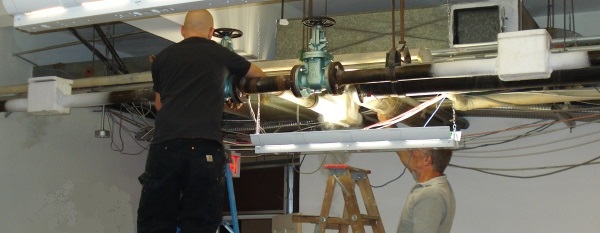Sustainable Pipe System Maintenance
We often read and hear about the benefits of constructing and designing eco-friendly, green, LEED engineered (Leadership in Energy & Environmental Design), sustainable buildings. These are the buzz words of modern construction development in North America today, but what about the maintenance of these structures?
We know that upgrading that chiller or boiler is going to save us energy and dollars over the course of its lifespan but what if those same savings are going to be gradually offset by poor maintenance practices?
What if those same maintenance practices were also hazardous to the environment and caused major inconvenience to the building occupants?
“Sustainable” no longer appears to be appropriate in this situation. Sustainable design and construction must be backed up by the equivalent approach to maintaining these systems in order to reap true long-term benefits.
For example:
A 4″ diameter shut off valve has to be replaced on a chilled (air conditioning) water pipe at a downtown office building. In many cases, the initial response of the contractor is to drain the system. Depending on the size of the building this may result in dumping hundreds or thousands of litres of water containing chemical corrosion inhibitors and or glycol.
The draining down alone can take several hours on a large system and overall down time is extended further as latent heating or cooling dissipates from the building. This creates a time lag before the building can heat up or cool down again once the maintenance work is completed.
Here we can identify a number of non-sustainable issues: wasting water; dumping chemicals into the sewer is hazardous to the environment; cost to replace chemicals; cost to refill and purge the system of air; time spent dealing with these issues and inconvenience to the building occupants due to extended system down time.
In addition, the process of draining down can also be in contravention of City Bylaws. In Vancouver, British Columbia ‘SEWER USE BYLAW NO. 299’ governs the drainage of fluids to the city sewer system, (http://www.metrovancouver.org/boards/bylaws/Bylaws/GVSDD_Bylaw_299.pdf). In order to be compliant with these regulations, mechanical maintenance contractors must store and re-use, or dispose of this waste in an approved manner. Contraventions of this Bylaw carry fines of up to $10,000 per incident.
System down time is extended as the heating or cooling within the building may be switched off for at least a day while the work is carried out. The costs and time to re-heat or cool the building are higher once the work is complete, as due to the passage of time, any latent heating or cooling has been removed from the building.
One modern and sustainable way to avoid all these problems is to use an industry proven technology pioneered in England in the 1970′s. Cryogenic pipe freezing enables a small section of pipe to be frozen quickly and safely. This acts as a temporary shut off valve, isolating the system and negating the need to drain down the entire contents of the pipe. This eliminates all of the associated problems identified above. The new valve is installed and the ice plugs are defrosted quickly and efficiently. The system is returned to normal, with no loss of water or chemical and with minimal or zero system downtime.
Returning to the example, by freezing the pipe either side of the valve, the 4″ valve can be swapped out, the pipe defrosted and the system returned to fully operational within 2 hours.
Nitro Pipe Freeze of Vancouver is a local company specializing in this area of sustainable pipe system maintenance. Nitro carry out work for hundreds of BC’s mechanical, HVAC and fire sprinkler contractors, isolating systems using their environmentally-friendly process.
Matt Farrell, President of Nitro says, ‘since 2009 we have literally prevented millions of litres of water and chemicals from being drained unnecessarily into the environment. HVAC systems containing chemicals should not be drained down due to the obvious disadvantages to the environment but even plain water systems, including domestic water and fire protection pipes, can be frozen to avoid draining valuable, previously treated water unnecessarily in to the sewer system.’
‘Cost savings can be astounding when performing maintenance on a large building, let alone the environmental costs of draining all these systems and the inconvenience to building occupants of prolonged system shut downs. Water conservation initiatives must run through the entire design and construction phase of buildings as well as being incorporated into the ongoing maintenance of them. At Nitro Pipe Freeze, We are trying to promote methods of sustainable pipe system maintenance so that all stakeholders can reap the benefits.’


